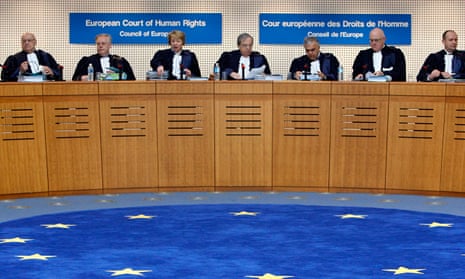It’s the spelling mistake that gives the game away. Like a twist in a fine legal thriller, a single misplaced letter in the Conservatives’ newest policy document, announcing a plan to scrap the Human Rights Act, reveals the true nature of the exercise. It confirms that, for all the legal veneer, this is strictly politics – not law. More than that, it is the latest example of a kind of displaced fury fast becoming the defining motif of politics – in Britain and beyond.
So what was this telling error of spelling? The Tory paper – titled, in traditional Orwellian fashion, Protecting Human Rights in the UK (just as a blueprint for selling off the NHS would doubtless be called Keeping the Health Service Safe) – refers to legal “judgements”. The sharp-eyed barrister and blogger Carl Gardner spotted the problem right away. “Lawyers tend to use the spelling ‘judgment’ for what’s given in court,” he wrote, “and ‘judgement’ for the personal quality many non-judges and not all judges have. The spelling used suggests no lawyer has been involved in drafting the document.”
That makes sense. Why hire a lawyer for what is obviously a political hit job? That much is borne out by the text, consisting of a series of promises that either address problems that don’t exist or propose changes that will change nothing.
So Chris Grayling, the justice secretary, promises that the replacement of “Labour’s Human Rights Act” by the Tories’ “British Bill of Rights and Responsibilities … will ensure that Parliament is the ultimate source of legal authority”. That sounds worthwhile, ensuring our laws are made by those we elect rather than faceless judges in distant Strasbourg. Except there’s no need. Parliament is already the ultimate source of legal authority, and has been for three centuries. If it were not, mere MPs would have no power to scrap the Human Rights Act, even if they wanted to. Those meddling foreign judges would stop them. But they can’t. It means the Grayling plan is that rarest of objects: a document whose very existence disproves its argument.
The text offers countless more examples in the same vein. The European court of human rights should no longer tie British judges’ hands, no longer issue “binding” rulings that “force the UK to change the law”. But Strasbourg can force no such thing. Sure, the European court’s rulings are binding on the UK as a state in terms of international law (though no one has yet found a way to enforce such law). But the court’s rulings don’t bind British judges or Westminster. They don’t reach into domestic law, which remains the exclusive province of our courts and our parliament.
For proof, look no further than the eight-year standoff over voting rights for prisoners. Strasbourg says there should be no ban on inmates voting, Westminster keeps saying no. The European court can huff and puff, but if parliament doesn’t want to budge it doesn’t have to. The judges in Strasbourg have no frigates to send across the Channel to force us to do anything.
So much for solving problems that don’t exist. An equal failing of Grayling is that his plan will do nothing for those problems that do exist. Take the Abu Qatada case, where ministers fumed with frustration as bleeding-heart foreign judges stopped them deporting a terror mastermind (I paraphrase). Trouble is, says Gardner, even Grayling’s supposedly muscular bill of rights would have made no difference in kicking out Abu Qatada: “I don’t think anything at all in these proposals would have changed what happened to him.”
The truth is, if the Conservatives were genuinely looking for a solution to the problems they raise, they would have to break with the European convention on human rights altogether. The Grayling document does leave that possibility open, with a warning that the Tories will pull Britain out if their new approach is rejected.
But it is hardly a serious threat. Even the current Conservative party does not want Britain to become the only European state other than Belarus to stand outside this most fundamental statement of human rights, one authored – mainly by British lawyers – in the shadow of 1945. Some part of the Tory brain still understands that the convention’s founding principle – that each country accepts a constraint on its behaviour, to embed human liberty in a part of the world where such rights have often been fragile – is a noble one.
No, this is not an argument about philosophy or the law. It’s crude politics. From now until May, the Tories will seek daily to blunt Ukip’s bayonets. Ukip demands rights for the English, so David Cameron “vows” to deliver us EVEL: “English votes for English laws”. Ukip wants out of the EU, so Cameron promises a referendum. And Ukip slams “human rights”, damned as the co-conspirator of “political correctness” in sending the country to the dogs, so the Tories promise to crack down on them too – and forget the pesky details.
You can reply to these questions with technical policy answers – about constitutional reform and legal jurisdictions – but that is to miss the point. Anger about excessive powers supposedly wielded by Strasbourg judges, Scottish MPs or the European Union is not really about institutional arrangements. It is instead the outlet for a much more visceral rage, the furious sense that the world is not as it should be – and that someone faraway must be to blame.
This is the pool of fury Ukip drinks from, and which the Tories want to channel their way. It imagines a utopia where everything would be well if only we could make our own rules without outsiders’ interference. Some of that sentiment was alive in the yes campaign in Scotland; much of it animates anti-EU feeling, both here and on the continent.
But it feels misplaced, an incoherent lashing-out that frequently hits the wrong target. People have good reason to feel impotent, too powerless to shape their own lives. But that’s not the fault of judges in Strasbourg or bureaucrats in Brussels. It owes more to the vast, borderless forces of globalisation that have upended economic life everywhere. Yet those forces are so much harder to see and harder to blame. So we train our fire on an easier, more visible enemy, like a European court that actually protects us far more than it hurts us.
This anti-European fury, stoked anew by Grayling and the Conservatives, is looking in the wrong direction. But it is rising – and who knows what target it will aim at next.










